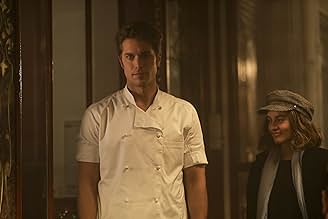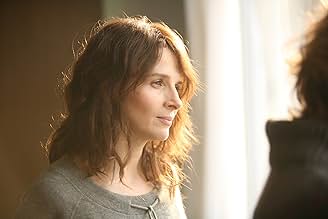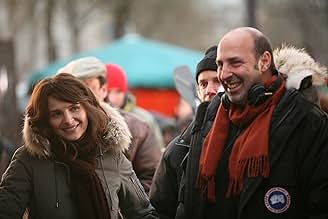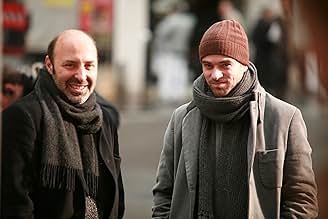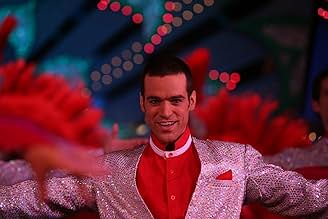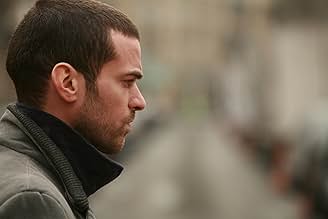Paris
- 2008
- Tous publics
- 2h 10m
IMDb RATING
6.8/10
13K
YOUR RATING
A ex-dancer has a heart problem and even with a transplant, he may still only have a few months to live. Time's spent looking at people/life in Paris from his balcony. His single mom sister ... Read allA ex-dancer has a heart problem and even with a transplant, he may still only have a few months to live. Time's spent looking at people/life in Paris from his balcony. His single mom sister moves in with her 3 kids to look after him.A ex-dancer has a heart problem and even with a transplant, he may still only have a few months to live. Time's spent looking at people/life in Paris from his balcony. His single mom sister moves in with her 3 kids to look after him.
- Awards
- 4 nominations total
- Director
- Writer
- All cast & crew
- Production, box office & more at IMDbPro
Featured reviews
A wonderfully complex study of both the city, and it's people on a wonderfully complex group of characters. Every one was as interesting as any other, regardless of the stature of the actor playing them, and you were invested in them all because of it. Juliette Binoche and Albert Dupontel were the most familiar names to me, but their characters were not allowed to dominate the story.
All along the way you were taken on journeys that were unsignposted and shocking, in some cases, because of it.
A quite extraordinary tale that deserves a far wider audience than it is likely to get. Overall the film was a shining example, in my opinion, of what makes French cinema the best in the world.
All along the way you were taken on journeys that were unsignposted and shocking, in some cases, because of it.
A quite extraordinary tale that deserves a far wider audience than it is likely to get. Overall the film was a shining example, in my opinion, of what makes French cinema the best in the world.
...if Klapisch hadn't wasted his time on all the plot threads that run through this over-long film. From Karin Viard as the bakery owner with her new helper Sabrina Ouazani, to the overly macho fruit and veg guys (Albert Dupontel, Zinedine Soualem and Gilles Lellouche) with their supermodel day-trippers, there is just too much material for the modest little picture that this really is. Klapisch, I guess, wants to be the Balzac of today's French cinema, and he has much talent--I enjoyed Chacun Cherche son chat and L'Auberge espagnole--but he must be more selective in telling his stories.
I took away from this exercise the performances of Fabrice Luchini, the history prof who decides to go into TV work when the fabulous salary is dangled before his eyes (100,000 euros a year!) and François Cluzet as his harried brother, an architect working on a nightmarish housing development (the computerized promotion film of which is one of the highlights of 2008). Honorable mention to Julie Ferrier as the ex-wife of one of the fruit vendors.
I took away from this exercise the performances of Fabrice Luchini, the history prof who decides to go into TV work when the fabulous salary is dangled before his eyes (100,000 euros a year!) and François Cluzet as his harried brother, an architect working on a nightmarish housing development (the computerized promotion film of which is one of the highlights of 2008). Honorable mention to Julie Ferrier as the ex-wife of one of the fruit vendors.
To day I went to see "Paris" and hoped to win a trip to Paris from Sydney out of it! I had seen L'auberge espagnole and had no idea of the link! To top this, by accident I caught a french movie on TV to night perhaps already running for 10 minutes and it was Russian Dolls! Again I did not realise it was related, even called a Sequel to l'auberge espagnole! I enjoyed the 3 movies each on their own way. "Paris", my birth city, I did enjoy immensely, yet I could have imagine its story in any other city. Although it was nice to catch up with sites I have not seen for 25 years and left nearly 40 years ago, but to me it was very much this cocktail of people and their personal situation that moved me so much. Just like everyday life with its humor, sadness and pain all this with a comfortable music that actually did ease a little the pain. Again I thank those who write so well here and gave a concise and very interesting account of this wonderful film. I think one of these writings should appear with the main page of the film rather than tentative account like mine. Bu if by chance you are reading mine I'd like to let you know that if you go to see this movie, just go with the flow and you should not be disappointed.
Paris is a kaleidoscopic view of that great City of Light inhabited with a variety of individuals each of whom is consumed with life and love and living and dying. Cédric Klapisch has written and directed this richly populated canvas as a background of a tender story of a Moulin Rouge male dancer Pierre (Romain Duris) who is diagnosed with a terminal heart disease requiring transplantation if he is to survive. But in the end the many characters introduced in 'incidental stories' have become so interesting that, instead of providing simply a background for Pierre's portrait, they become an integral part of the drama as well as indelibly stamped on the viewer's mind.
Pierre has kept his illness secret, yet when faced with the dire concept of a transplant he confides in his sister Élise (Juliette Binoche), a single mother of three, who takes him in to fill his boring days of self confinement. There is a palpable magic between the two as Élise attempts to bring Pierre out into the world of hope and of living. Incidental to her life are trips to the market where she observes the lives of the grocers and discovers their private lifestyles, information shared freely with the viewer. A Parisian North African communicates with his brother at home with a postcard of Paris, seducing the brother to brave all odds to come to the city. We also meet a jaded art historian Roland Verneuil (Fabrice Luchini) whose father has just died, an event that devastates his emotional brother Philippe (François Cluzet): Roland proceeds to have an affair with a student but his physical awakening is abruptly altered by the realities of Parisian life while Philippe progresses through his seemingly mundane existence toward a surprise ending. The grocers seek adventures with a group of girls among whom is the ex-wife of one of the men and in the process we observe the varying reactions of interpersonal relationships tested away from the eyes of group participation. All of these stories are white noise to Pierre's situation, and though Élise is able to make Pierre 'dance again' at a party of his fellow dancers she organizes, in the end Pierre is left to care for Élise's children while Élise finally opens her frozen heart to a new romance. At this point Pierre receives the inevitable telephone call that a transplant is ready, and as he proceeds to the hospital he opens his mind to the beauties of Paris. Some of the vignettes we have observed are completed while most simply continue - just like life in the glorious city so often considered the city of love.
All of the many roles are enacted by gifted actors, the cinematography offers us a different view of Paris than that of postcards and travel brochures, and the musical score ranges from popular music to the haunting 'Gnossiemme No. 1' of Erik Satie which is Pierre's theme music. At times the viewer feels lost in the complex overlay of the many stories being told, but settling back in a chair and just absorbing the film results in an evening of Parisian intoxication.
Grady Harp
Pierre has kept his illness secret, yet when faced with the dire concept of a transplant he confides in his sister Élise (Juliette Binoche), a single mother of three, who takes him in to fill his boring days of self confinement. There is a palpable magic between the two as Élise attempts to bring Pierre out into the world of hope and of living. Incidental to her life are trips to the market where she observes the lives of the grocers and discovers their private lifestyles, information shared freely with the viewer. A Parisian North African communicates with his brother at home with a postcard of Paris, seducing the brother to brave all odds to come to the city. We also meet a jaded art historian Roland Verneuil (Fabrice Luchini) whose father has just died, an event that devastates his emotional brother Philippe (François Cluzet): Roland proceeds to have an affair with a student but his physical awakening is abruptly altered by the realities of Parisian life while Philippe progresses through his seemingly mundane existence toward a surprise ending. The grocers seek adventures with a group of girls among whom is the ex-wife of one of the men and in the process we observe the varying reactions of interpersonal relationships tested away from the eyes of group participation. All of these stories are white noise to Pierre's situation, and though Élise is able to make Pierre 'dance again' at a party of his fellow dancers she organizes, in the end Pierre is left to care for Élise's children while Élise finally opens her frozen heart to a new romance. At this point Pierre receives the inevitable telephone call that a transplant is ready, and as he proceeds to the hospital he opens his mind to the beauties of Paris. Some of the vignettes we have observed are completed while most simply continue - just like life in the glorious city so often considered the city of love.
All of the many roles are enacted by gifted actors, the cinematography offers us a different view of Paris than that of postcards and travel brochures, and the musical score ranges from popular music to the haunting 'Gnossiemme No. 1' of Erik Satie which is Pierre's theme music. At times the viewer feels lost in the complex overlay of the many stories being told, but settling back in a chair and just absorbing the film results in an evening of Parisian intoxication.
Grady Harp
I was really looking forward to see this film for different reasons: The trailer made it look really heart filling, Juliet Binoche and basically because I love French cinema. So I finally got to do so, but man was I disappointed.
It wasn't utterly bad, but basically, for me, it just didn't grab me at any point. Everything and everyone (Each character) seemed so dry, so inexpressive, things would happen and they'd all be like "OH... o.k" and at moments they even seemed to contradict them self's. I don't know, I've seen lots of movies where each characters story is intertwined and some are good, some suck.
I've seen it in American, Italian, French, German and even Spanish cinema, so that kind of story telling is not unique in it self anymore and because of that, it's harder to do it, and I think that in this case, seeing how non of the stories needed the other to exist, none of them really coexisted as one and there fore there was no reason to tell them all in the same piece, well it simply wasn't the best of movies, again it doesn't utterly suck, it just isn't as good as it could have been.
It wasn't utterly bad, but basically, for me, it just didn't grab me at any point. Everything and everyone (Each character) seemed so dry, so inexpressive, things would happen and they'd all be like "OH... o.k" and at moments they even seemed to contradict them self's. I don't know, I've seen lots of movies where each characters story is intertwined and some are good, some suck.
I've seen it in American, Italian, French, German and even Spanish cinema, so that kind of story telling is not unique in it self anymore and because of that, it's harder to do it, and I think that in this case, seeing how non of the stories needed the other to exist, none of them really coexisted as one and there fore there was no reason to tell them all in the same piece, well it simply wasn't the best of movies, again it doesn't utterly suck, it just isn't as good as it could have been.
Did you know
- TriviaAs end credits conclude, the choreographed dance show with Pierre shown earlier has a brief repeat.
- GoofsWhen the shop-owner of the bakery sell a baguette she asks for 80 cent, doesn't register it in the till, which has the figures 0,00 than it changes to 0,78 than back to 0,00 again.
- SoundtracksMunivers de Paris
Written by Robert Burke (as R. Burke) and Loïc Dury (as L. Dury)
Performed by Kraked Unit
Universal Music Publishing
MGB / Kraked - ce qui me meut production
- How long is Paris?Powered by Alexa
Details
- Release date
- Country of origin
- Official site
- Language
- Also known as
- Париж
- Filming locations
- Production companies
- See more company credits at IMDbPro
Box office
- Budget
- $12,000,000 (estimated)
- Gross US & Canada
- $1,010,194
- Opening weekend US & Canada
- $46,518
- Sep 20, 2009
- Gross worldwide
- $23,328,518
- Runtime2 hours 10 minutes
- Color
- Sound mix
- Aspect ratio
- 2.35 : 1
Contribute to this page
Suggest an edit or add missing content



